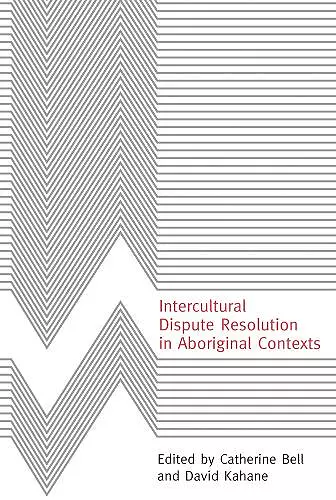Intercultural Dispute Resolution in Aboriginal Contexts
Catherine Bell editor David Kahane editor
Format:Hardback
Publisher:University of British Columbia Press
Published:21st Apr '04
Currently unavailable, and unfortunately no date known when it will be back

Readers who are not directly involved in or interested to research either Alternative Dispute Resolution (ADR) or First Nations/Aboriginal issues, might be inclined to take no notice of this stellar volume edited by Catherine Bell and David Kahane. To ignore the volume would be a mistake for any scholar interested in conversations about multiculturalism, recognition, institution-building, democracy, liberalism, process design, and pluralism... I was pleased to find that this complex and thorough volume fulfilled each level of reading I might undertake. It avoids many of the problems often inherent to edited collections, and takes care as well to provide essays that are self-reflective and thoughtful about complex issues of generalization, voice, and neutrality. These essays work very well together, and the volume itself is coherent, enjoyable, and refreshing. I highly recommend it. -- Renee Ann Cramer, Assistant Professor of Political Science, California State University at Long Beach Bell and Kahane should be congratulated for bringing together such diverse views and voices. This is a significant and welcome collection that should grace the bookshelf of any serious conflict theorist attempting a level of competency in intercultural conflict, not only in the Aboriginal/non-Aboriginal context, but more generally. -- Colleen Hanycz Osgoode Hall Law Journal, Vol. 43, No. 3
The essays collected here provide a balanced view of alternative dispute resolution, exploring its opportunities and effectiveness alongside its challenges and limits.
In the last twenty years, there has been a growing interest in alternative dispute resolution (ADR), as scholars and practitioners seek more effective, context-sensitive approaches to conflict. Where formerly conflict was tackled and “resolved” in formal legal settings and with an adversarial spirit, more conciliatory approaches – negotiation, mediation, problem-solving, and arbitration – are now gaining favour. These new methods are proving especially appropriate in intercultural contexts, particularly for Aboriginal land claims, self-government, and community-based disputes.
The essays collected here by Catherine Bell and David Kahane provide a balanced view of ADR, exploring its opportunities and effectiveness alongside its challenges and limits. The essays are international in scope, with examples of efforts at dispute resolution involving Inuit and Arctic peoples, Dene, Gitxsan and Wet’suwet’en, Tsuu T’ina, Cree, Metis, Navajo, Maori, Aboriginal Australians, and Torres Strait Islanders.
With contributions from Aboriginal and non-Aboriginal theorists and practitioners, Intercultural Dispute Resolution in Aboriginal Contexts presents an array of insightful perspectives. This book will appeal to students and scholars of Aboriginal law and alternative dispute resolution; legal and political theorists; dispute resolution practitioners; and anyone involved in struggles around land claims, treaty, and self-government agreements in Canada or abroad.
ISBN: 9780774810265
Dimensions: unknown
Weight: 640g
392 pages